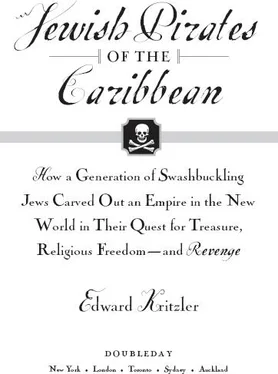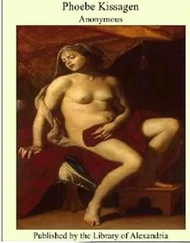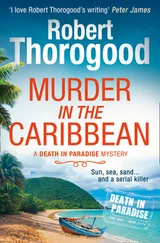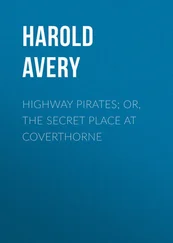Edward Kritzler - Jewish Pirates of the Caribbean
Здесь есть возможность читать онлайн «Edward Kritzler - Jewish Pirates of the Caribbean» весь текст электронной книги совершенно бесплатно (целиком полную версию без сокращений). В некоторых случаях можно слушать аудио, скачать через торрент в формате fb2 и присутствует краткое содержание. Год выпуска: 2008, ISBN: 2008, Издательство: Knopf Doubleday Publishing Group, Жанр: Старинная литература, на английском языке. Описание произведения, (предисловие) а так же отзывы посетителей доступны на портале библиотеки ЛибКат.
- Название:Jewish Pirates of the Caribbean
- Автор:
- Издательство:Knopf Doubleday Publishing Group
- Жанр:
- Год:2008
- ISBN:9780385528368
- Рейтинг книги:3 / 5. Голосов: 1
-
Избранное:Добавить в избранное
- Отзывы:
-
Ваша оценка:
- 60
- 1
- 2
- 3
- 4
- 5
Jewish Pirates of the Caribbean: краткое содержание, описание и аннотация
Предлагаем к чтению аннотацию, описание, краткое содержание или предисловие (зависит от того, что написал сам автор книги «Jewish Pirates of the Caribbean»). Если вы не нашли необходимую информацию о книге — напишите в комментариях, мы постараемся отыскать её.
Jewish Pirates of the Caribbean — читать онлайн бесплатно полную книгу (весь текст) целиком
Ниже представлен текст книги, разбитый по страницам. Система сохранения места последней прочитанной страницы, позволяет с удобством читать онлайн бесплатно книгу «Jewish Pirates of the Caribbean», без необходимости каждый раз заново искать на чём Вы остановились. Поставьте закладку, и сможете в любой момент перейти на страницу, на которой закончили чтение.
Интервал:
Закладка:
This will be a loss to the Crown because Jamaica is another Sicily in Italy, for it provides all the neighboring countries as well as the Main and New Spain and is the centre of them all. If times should change…whoever is Lord of Jamaica will be Lord of these places on account of its situation…His Majesty should on no account part with it. 27
Over time, the remaining Spanish colonists in New Seville joined the Portugals in La Vega. However, with ownership vested in the discoverer’s family, few Spaniards were interested in settling what came to be called Columbus’s island. Those already there were mostly ranchers, raising horses, cattle, and pigs. By midcentury, their power was at a low point, while the Portugals, who were mostly engaged in trade, prospered, in part by supplying passing conquistadors with horses and provisions.
Although the hidalgos were often in conflict with the Portugals, a century would pass before accusations of Judaizing surfaced. Apparently they maintained a Christian façade, attended church, and had their children baptized. Probably they adhered to some of the same practices as the secret Jews in Mexico and other Spanish colonies, who gathered in secret on certain nights to read from the Torah. They fasted twice a week for their apostasy, adored Purim’s Queen Esther as a covert Jew like themselves, and viewed Haman as the Grand Inquisitor.
Meanwhile, back in the Mediterranean, Charles’s nemesis Sinan, who never hid behind a Christian mask, continued the marauding that would seal Suleiman’s power in the eastern Mediterranean. In 1538, the Jewish corsair destroyed most of Spain’s naval fleet off the port of Preveza in Greece, and the following year he blockaded the Gulf of Cattaro on the Dalmatian coast and forced the surrender of the last Spanish garrison. These defeats for Charles, coupled with the death in childbirth in 1539 of his beloved wife, Isabella, plunged the emperor into a despair that was only dispelled by aggressive action against false conversos and planning a renewed war against the infidel.
Charles’s motive when he allowed Spain’s conversos to settle in Antwerp in 1536 was purely mercenary. What they believed didn’t concern him. But this attitude changed when King John followed suit, and soon Portugal’s conversos were outperforming those from Spain in the burgeoning East Indian spice trade, netting Portugal’s king nearly a million ducats a year. 28Accordingly, Charles reversed the policy. Knowing that Portugal’s Jews, having been forcibly converted, were more likely to Judaize, in 1540 he ordered Antwerp’s bailiff “to proceed with utmost severity” against suspect conversos. 29
Charles next turned his attention to capturing Algiers, the Ottoman outpost closest to Spain. As he had taken Tunis, so he would conquer the sultan’s primary stronghold in his sector of the Mediterranean. In the fall of 1541, Charles advanced on Algiers with a force of fifty warships, two hundred support vessels, and an army of nearly twenty thousand. As the port was lightly defended by a garrison of four thousand men, he had good reason to be confident.
But on the night of October 23, as his army was disembarking on a beach near Algiers, thunderous black clouds out of the northeast darkened the landing site and burst upon them. For three days, an unceasing storm and gale-force winds wracked the invaders. Fourteen warships were dashed against the rocks and a hundred transport vessels destroyed, with the loss of eight thousand men. Those who made it ashore were stuck in a muddy quagmire. At the end of the tempest, Moorish horsemen charged down from the hills, their swords flaying the imperial troops. Charles, soaked to the skin, with sword in hand, tried to rally his men, but considering the situation, ordered his army to re-embark. When the fleet regrouped fifteen miles down the coast, the conqueror of Mexico, Hernando Cortés, whom Charles had invited along, advised a counterattack. But the emperor, his troops dispirited, exhausted, and ill-equipped, reluctantly ended the expedition, blaming its failure on the weather. During the invasion, the two thousand Jews of Algiers, knowing the fate that had befallen their brethren in Tunis, lived in great fear. Afterward, in commemoration of the three days when the heavens opened up in their defense, they instituted a special holiday with three days of fasting and celebration. 30
In 1544, a year after his Algiers disaster, Charles left Spain for Flanders and did not return until 1556. As Charles departed in sadness, Sinan rejoiced. The Jewish corsair was at the Red Sea port of Suez that year, building a fleet to support an Indian prince’s effort to evict the Portuguese, when he got word that Barbarossa had rescued Sinan’s kidnapped son. Five years before, the boy had been taken by imperial forces on his way to rejoin his father after Sinan’s latest victory. He was eventually delivered to the Lord of Elba, who baptized the child and raised him at court. Several times Barbarossa tried to ransom the boy without success. Finally in 1544, when sailing near Elba, he sent an envoy to bargain for the youth’s return, only to be told that the ruler’s “religious scruples forbade him to surrender a baptized Christian to an infidel.” A furious Barbarossa landed his men, sacked the town of Piombino, and blew up the fort. At this point the Lord of Elba agreed to surrender his “boy-favorite.” 31
In 1551, after a stint as governor of Algiers, Sinan, now Kaptan Pasha, commander of the Turkish navy, captured Tripoli. Occupying the port, he imprisoned the Knights of Malta, who had moved there from their island. After first hauling them back to Constantinople and parading them in chains before the sultan, Sinan—gracious in victory in contrast to Charles’s crusaders at Tunis—set the humbled knights free.
In May 1553, in his final recorded action, Sinan sailed down the Dardanelles from Gallipoli with 150 ships, including twenty French galleys, and ravaged the coastal districts of southern Italy and Sicily. Before returning to Constantinople, he landed on Corsica at the behest of the king of France and expelled the Genoese. That is the last we hear of “the famous Jewish pirate,” noted for his humane treatment of prisoners and his magical powers. His untutored crew bragged that he needed no more than a crossbow to find the height of the stars to determine their position at sea. (In truth, his crossbow was a “Jacob’s staff,” an early form of sextant.)
Charles’s final years were not as fortunate. In 1556, the pressures of the job drove him to abdicate in favor of his son Philip II, give half his empire to his brother Ferdinand, and retire to a monastery. 32The Venetian ambassador wrote that he was “not greedy of territory, but most greedy of peace and quiet.” 33Yet war was his constant affair and he was utterly worn out by it. In the company of monks, the emperor spent the last two years of his life fishing for trout from a tower window over a rushing stream and trying to synchronize his sizeable collection of 159 clocks. He is said to have exclaimed after giving up in vain: “How foolish I have been to think I could make all men believe alike about religion or unite all my dominions when I cannot even make these clocks strike the hour together?” 34
In September 1558, after a long illness and tormented by the gout that left him an invalid, Charles cried, “Oh Lord, I go,” and died. Sinan, who had always been a thorn in his side, also died that year. His tombstone at Istanbul’s Scutari cemetery reads in part:
Towards his friends, Sinan was another Joseph; his enemies dreaded him like a dart. Let us pray to Heaven for Sinan; may God cause his soul to rejoice…The Kaptan Pasha has entered the realm of Divine Mercy. 35
An assessment of Charles’s reign has to conclude that he overreached and overspent. The empire was too big, his enemies and the forces against him too powerful. The tides of history were not in his favor. Spain had stopped producing. Relying on gold and silver from the New World to import most everything doubled the prices of goods. Europe thereby profited, while Spain’s treasury by the time he abdicated was 20 million ducats in debt.
Читать дальшеИнтервал:
Закладка:
Похожие книги на «Jewish Pirates of the Caribbean»
Представляем Вашему вниманию похожие книги на «Jewish Pirates of the Caribbean» списком для выбора. Мы отобрали схожую по названию и смыслу литературу в надежде предоставить читателям больше вариантов отыскать новые, интересные, ещё непрочитанные произведения.
Обсуждение, отзывы о книге «Jewish Pirates of the Caribbean» и просто собственные мнения читателей. Оставьте ваши комментарии, напишите, что Вы думаете о произведении, его смысле или главных героях. Укажите что конкретно понравилось, а что нет, и почему Вы так считаете.












